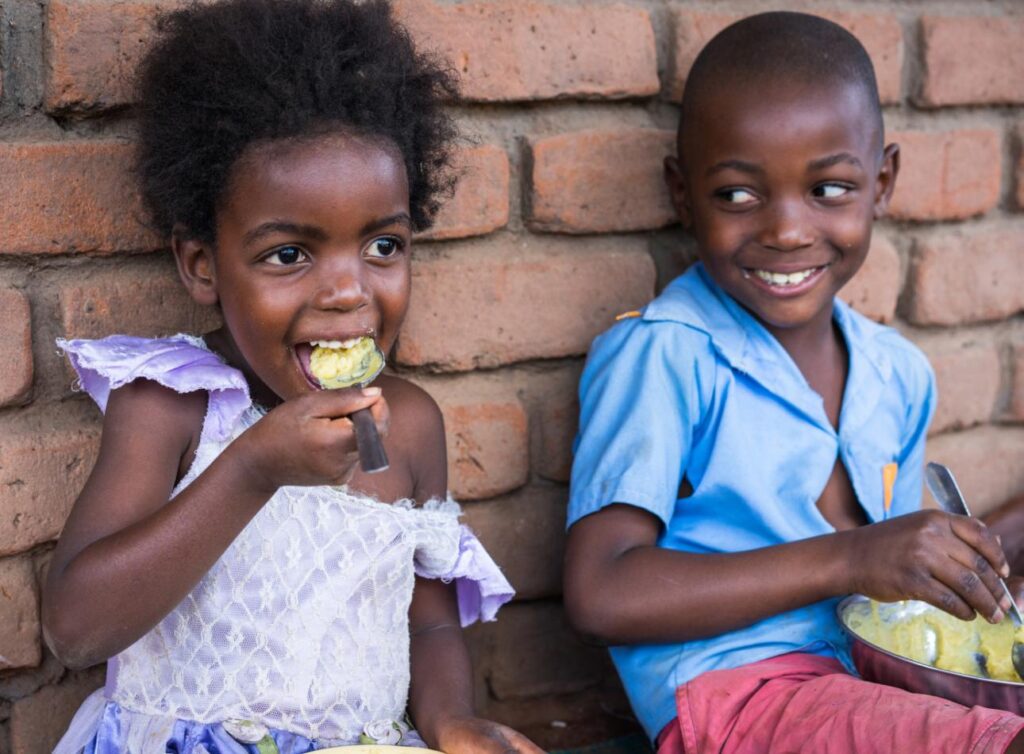The United Nations World Food Programme (WFP) is extending its partnership with the Novo Nordisk Foundation, through a historic private-public sector collaboration that brings in the Danish Ministry of Foreign Affairs and the Grundfos Foundation, to expand the home-grown school meals programme in Kenya, Rwanda, and Uganda.
According to a Tuesday WFP press release, this partnership builds on WFP’s leading work on school meals globally to co-create a programme to deliver safe, nutritious, and locally sourced school meals, while also strengthening the climate resilience of smallholder farmers and promoting clean cooking solutions in schools. The partnership includes a strong focus on research and learning, leveraging the expertise of the Novo Nordisk Foundation and the Grundfos Foundation.
“School meals are so much more than just a plate of food – they are transformational programs that help vulnerable children to learn, communities to make a sustainable living and economies to grow and prosper,” said Cindy McCain, Executive Director, UN World Food Programme. “This pioneering partnership demonstrates how we can bring together expertise from the private and public sectors to create and fund innovative programs that address the root causes of hunger and support long-term resilience against food insecurity.”
Running from January 2025 for three years, the initiative is backed by a historic USD 40 million in co-financing from the Danish Government and the two foundations – the first of its kind to WFP. Over the next three years, the initiative will reach 321,400 students in 375 schools across East Africa with nutritious home-grown meals. Around these schools, the partnership will build an ecosystem of support that ensures the long-term sustainability of the initiative. This includes establishing 1,300 school gardens, training 61,500 smallholder farmers in climate-smart food production, and equipping schools with fuel-efficient cooking infrastructure, WFP said.
The partnership builds on an initial phase that ran from November 2022 to December 2024 in Rwanda and Uganda with an initial USD 4.1 million investment from the Novo Nordisk Foundation. This second phase expands on the effort to include schools in Kenya’s Turkana County and scale up coverage in Uganda and Rwanda.
“By supporting homegrown school meal programmes, we are able to address both human and planetary health through the advancement of nutritious meals and clean cooking methods in schools coupled with climate-smart agriculture,” said Mads Krogsgaard Thomsen, CEO, Novo Nordisk Foundation. “Schools hold great potential to be catalytic platforms for food systems transformation while improving the health and learning outcomes of children.”
The home-grown school meals programme is a flagship WFP initiative that addresses some of the most pressing challenges facing both people and the planet: food insecurity and sustainable agricultural practices.
“The linking of school meal programmes to local agriculture creates stable markets for smallholder farmers, helps to foster job creation—particularly for women—and supports the transition to climate-smart agricultural techniques,” the statement said. “It also supports the local governments’ national development agenda, aligning with broader momentum around the school meals in the region and globally through the School Meals Coalition, which WFP serves as the Secretariat.”
In addition, water, sanitation, and hygiene (WASH) facilities will be constructed or rehabilitated, cooks and school staff will receive training, and public information campaigns will inform and educate the local communities. Government staff will also be trained to strengthen national capacity.
“More can be achieved when government, business, and civil society join hands and find solutions together. It is a top priority for the Danish government to build stronger partnerships between public and private actors. This partnership is a great example of that aspiration,” said Lars Løkke Rasmussen, Minister of Foreign Affairs of Denmark. “It will not only provide nutritious and healthy meals for school children and help improve food security, but also build resilience and generate employment in Kenya, Rwanda, and Uganda.”
This initiative underscores the commitment of WFP and its partners to fostering resilient food systems and ensuring that school meals provide not only essential nutrition but also long-term economic and environmental benefits. By connecting school meal procurement to local agriculture, the programme enhances food security, supports smallholder farmers, and strengthens local economies.
“This partnership offers a unique opportunity to create lasting, sustainable change with a long-term impact on both children, youth, and adults by leveraging the combined strengths of the partners,” said Kim Nøhr Skibsted, Executive Director, Grundfos Foundation. “With this partnership, water solutions for climate-smart production will be strengthened by expanding water access and providing climate adaptation solutions.”
The School Meals Coalition is a government-led network of over 100 governments, 6 regional and sub-regional bodies and over 140 partners committed to school meals. It drives actions to urgently improve and scale up school meal programmes to ensure that every child can receive a healthy, nutritious meal in school by 2030. WFP serves as the Secretariat to the School Meals Coalition.




